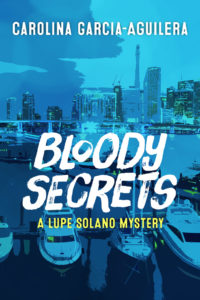In 1986, a dark-haired mother of three applied for a job at a Miami private detective agency. When the boss asked why she wanted to work there, she lied.
“I told them my husband had left me and I had to pay the bills,” said Carolina Garcia-Aguilera.
The ruse worked. He hired her.
The truth, as often happens in Florida, was stranger than fiction. Garcia-Aguilera was an aspiring mystery novelist, one who started reading Sherlock Holmes stories in Spanish as a 7-year-old in Cuba. She wanted to write books about a female private eye in Miami, but she had run into problems with knowing how the business worked. For research purposes, she decided to get a job as a female private eye in Miami.
“I became a PI so I could write the books,” she said.
A decade later, in 1996, G.P. Putnam published Bloody Waters, her first novel about private detective Guadalupe “Lupe” Solano, a self-described “Cuban-American princess” who stands just a shade over 5 feet tall and carries a Beretta in her Chanel purse. She’s tough and tenacious, but she also has a weakness for fine food, expensive clothes and going to bed with any man she finds attractive. Kirkus Reviews hailed Garcia-Aguilera as “a talent worth watching.”
Six more Lupe Solano novels followed and sold well enough to be translated into a dozen languages. In her New York Times column, Marilyn Stasio praised Lupe for her “snappy style and a healthy self-confidence in her professional skills.” She was even profiled by the Times.
The fifth Lupe book, Havana Heat, won the Shamus Award for best private eye novel in hardback from the Private Eye Writers of America, an award previously won by such luminaries as Sue Grafton, Bill Pronzini, Robert Crais, Lawrence Block and Don Winslow. Garcia-Aguilera was the first (and, so far, only) Latina author to win that particular prize. Unfortunately, the awards dinner fell just after 9/11, so it was canceled.
“You know how I found out I won? I got a fax,” Garcia-Aguilera said. “It wasn’t very dramatic.”
Her books brought her other kinds of acclaim. At the Florida State Prison in Raiford, she said, the Lupe novels were “the most popular books to check out.”
Not everyone was a fan, of course: “I was excoriated for her sex—all the men.” But Garcia-Aguilera didn’t care. “I don’t give a damn. It’s my book…. I wanted her to be able to do whatever she wanted.”
That’s why, instead of going with the stereotypical down-at-the-heels gumshoe, she made Lupe the daughter of a well-to-do building contractor. Lupe’s no anti-social loner, either. She and her two adult sisters—all of them named for Catholic saints—live in her widowed Papi’s mansion in an upscale waterfront section of Miami called Cocoplum. They are waited on by two elderly servants who accompanied the family when they fled Cuba. Lupe drives a Mercedes and keeps bottles of champagne in her office fridge. Her clients tend to be members of the Cuban-American elite who are willing to pay top dollar for her discreet help.
Each book features Lupe tackling an investigation that takes some wild twists and turns, but it’s grounded in the kinds of things real detectives do: digging through a target’s trash, running license plates, doing surveillance work.
The Lupe Solano mysteries quickly found an audience among those excited to see someone who shared their Cuban heritage writing in a genre dominated by white male authors.
“When I discovered the Lupe novels, it felt like coming home,” said Alex Segura, who counts Garcia-Aguilera as a major influence on his series of books about South Florida private eye Pete Fernandez, which concluded in 2019 with Miami Midnight. “It was the crime novel I needed to find to nudge me along my way.”
“I recall just melting into the page,” said Raquel Reyes, who co-chairs Florida’s annual SleuthFest convention and serves as a board member of the Florida chapter of Mystery Writers of America.
The seventh Lupe Solano novel was published a decade ago, and Garcia-Aguilera moved on to other genres, tackling romance and erotica. She kept her PI license current, just to maintain what she called “street cred,” but that was her only connection to the world of crime.
But in a December interview, the 71-year-old author said she wasn’t done with Lupe just yet, or vice versa. She said she has written an eighth book in the series and her agent is shopping it around to publishers.
For fans such as Les Standiford, founding director of the Florida International University creative writing program and editor of Miami Noir and Miami Noir: The Classics (both of which feature stories by Garcia-Aguilera) this is thrilling news.
“Anyone who hasn’t discovered Lupe Solano yet,” he said, “now’s the time to do it.”
***
Standiford, who in the 1990s wrote a nine-book series about a Miami building contractor who turns amateur sleuth, remembers first meeting Garcia-Aguilera at a party several years before her first novel was published.
She talked to him about his books and then mentioned working as a private investigator to do research for her own writing, which astounded him. He had heard of detectives who became writers—Dashiell Hammett is the best known—but never a wannabe writer deciding to become a PI first. On top of that, she struck him as the opposite of a hard-nosed private eye.
“She’s bubbly. She’s vivacious. She’s funny,” said Standiford,
Reyes, after hearing Garcia-Aguilera talk about her PI career at a conference, drew a different conclusion: “Some of the stories she told us, I would not want to mess with her.”
Her background prepared her for this. The Havana where she grew up was a violent place. “During the revolution there were gunshots outside my house all the time,” she told the Orlando Sentinel in 2002. “I spent a lot of time reading under the kitchen table.”
A year after Fidel Castro seized power, when she was 10, her family fled Cuba with just the clothes on their backs. They lived in Palm Beach for two years, then moved to New York.
She came back to Florida, though, to study history and political science at Rollins College (also the alma mater of PBS kids’ show star Fred Rogers). She put herself through college in part by writing papers for other students, in particular the soccer team.
“It taught me how to do research on stuff I wasn’t familiar with,” she said, laughing.
After graduating from Rollins, she studied languages at Georgetown University in Washington, D.C., until she got married. Her husband’s job took them to Hong Kong, Tokyo and Beijing. When they returned to Florida, she earned an MBA at the University of South Florida in Tampa. By then she had divorced her husband and decided to move to Miami to be closer to her siblings.
She took a social worker job at a large public hospital for two years, remarried, had her third child and worked toward a Ph.D. in international studies. Meanwhile, she also served as a guardian ad litem, someone appointed by the court to represent the best interests of an abused, neglected or abandoned child in legal proceedings.
Her work with judges and attorneys helped when she needed references for her private eye business, and in creating supporting characters for her mystery novels. But getting into the business herself proved to be the most important move.
The detective firm that first hired her “was not the highest caliber of PI firms,” Garcia-Aguilera said. “The fact that they hired me should tell you a lot about them.”
Nevertheless, she learned a lot there, lessons that would help her both in her PI work and in creating Lupe Solano’s world. She learned, for instance, that people who are trying to dodge arrest might stop to change their clothes, but they hardly ever change their shoes. She learned to shoot straight and keep her gun clean and oiled. She learned how to interview people. She learned that clients often lie because they don’t want to be viewed in a bad light. And she learned all about surveillance tactics.
“There’s nothing like sitting in a car in the pitch blackness doing surveillance with your bladder screaming because it’s about to burst,” she said, laughing. “My motto is, if you see a bathroom, use it, whether you need to or not.”
Unlike Lupe, she didn’t drive a Mercedes. Instead, she was usually in a Volvo station wagon “with a dog in the back and all the kiddie seats.” Sometimes she had to ask her fellow detectives to babysit her kids while she was on a stakeout. She would keep a phone close by in case her daughters needed their mom’s help with their homework.
Garcia-Aguilera decided to quit and start her own agency, partnering with a former Alcohol, Tobacco and Firearms agent. The office they opened was in such a sleazy part of Miami, she said, that “we were always happy when our cars were still in the parking lot at the end of the day.” (Lupe, by contrast, works out of a neat little cottage in upscale Coral Gables.)
This was during the height of the “cocaine cowboys” era in Miami, when drug dealers had shootouts on the interstate and even massacred rivals at the Dadeland Mall in broad daylight. She tried to focus on financial crimes, figuring those would be easy work. She was wrong.
“Every case we took on, even if it was finding out whether someone’s dog pooped on your lawn or not, turned out to involve drugs,” Garcia-Aguilera said.
By the ‘90s, though, financial crimes were on the rise, requiring her expertise in tracing assets, detecting fraud and uncovering money laundering. Still, she wound up pursing some cases “where there was a body on the ground.”
Their agency did handle domestic cases, which she said could be very lucrative yet also very unnecessary. Florida is a no-fault divorce state, so there was no need for their clients to prove infidelity, she said.
“They just wanted to screw with their spouses,” she said. “One time a man hired me because he thought his wife was having an affair. I found out she was having an affair with his brother. I provided him with the proof on video. So he threw a big family barbecue, and then he announced, ‘Hey, let’s watch a video!’ and he showed that video to everyone, with the grandparents and the kids there and everything.”
Garcia-Aguilera sighed, then said, “That’s the day I stopped doing domestics. There are consequences to these things, and I didn’t like it.”
Some cases were grislier than others. She had a jailhouse interview once with a man accused of killing, dismembering and then barbecuing his neighbor. After listening to the killer describe marinating the body to tenderize the meat before cooking it, she wrote in her notebook, “Get the recipe.” (She used this in a short story published in Miami Noir called “The Recipe.”)
She got so caught up in her private eye work, she nearly lost sight of the reason she’d signed up for it. Then she got a reminder.
“One morning my husband said to me—as I was leaving the house at 3 am for a stakeout—‘When are you going to finally start writing that book?’” she said. “So I finally started writing Bloody Waters.”
***
The opening pages of Bloody Waters offer the perfect introduction to Lupe.
She’s at a firing range, working to improve her accuracy and musing to herself on gender roles: “It doesn’t take a genius to figure out guns were invented by men—no woman would ever abuse her hands that way. If a woman had designed the first gun, she would have found a way to ensure that her nail polish wouldn’t chip during reloading.”
But then she scoffs at the girlie-pink guns being marketed to women: “Really, what’s the point of a cute gun? …Guns are for killing—whatever their color, shape or size.”
Lupe’s narration is a major attraction for readers. She manages to be sardonic but not cynical, self-aware but not self-important. She’s also extremely knowledgeable about Miami’s high and low culture, navigating easily between the high-society doings of the richest of the rich, the glittering nightlife of super-hip South Beach and the no-tell motels and back-alley crack dens where her cases sometimes take her.
“She sees the city for what it is, a flawed, blended and corrupt place with lots of divisions,” Segura said.
Reyes said she delighted in seeing Lupe Solano drive down streets she recognized and eat at restaurants she’d visited. More importantly, she said, Garcia-Aguilera captures the Miami Cuban attitude and the pervasiveness of the Catholic Church in Miami’s private and public life. (Lupe’s favorite sister Lourdes—named for Garcia-Aguilera’s mother—is a hip nun who insists Lupe keep three Catholic medals pinned to her bra for protection against evil.)
“She nails it—she nails the details,” Reyes said.
Yet the realism of the Miami setting and atmosphere is accompanied by the kind of outlandish situations you won’t find in other mystery novels. In one book, Lupe’s client is a high-priced call girl who’s also supposedly a virgin. In another, Lupe is hired by the mother superior of one convent to investigate whether another convent is trying to pull off a phony miracle. In Havana Heat, the one that won the Shamus, Lupe’s client is a rich old woman who demands she locate a long-missing tapestry and smuggle it out of Cuba in time to show it to the client’s even older mother on her deathbed.
Of course, Standiford pointed out, “that’s part…of the happy accident of living in Florida,” where the outlandish tends to be the norm. Sometimes, the best story ideas come from just reading the morning papers.
The odd situations push Lupe to try unusual tactics. For instance, to investigate the convent, she dispatches one of her female operatives to set up a hot dog cart across the street, while dressed in a thong bikini (bikini-clad hot dog vendors were a common sight by the roads of South Florida in the 1990s). Inside the cart is a camera to snap pictures of the cars entering and leaving. All goes well until a county code inspector shows up to check her license.
Although the author and her heroine share a profession, there are differences. Garcia-Aguilera is taller (5-foot-5) and carried a Colt .45, not a Berretta. And unlike the fun-loving but single Lupe, she’s a proud mom who dedicated each of her books to her children.
Garcia-Aguilera can’t directly tap her PI experiences for her novels because her clients are promised confidentiality. Thus, she flips the gender or finds some other way to obscure the source material, she said. She joked that her favorite research is checking the menus of the restaurants she mentions.
“You’d think they’d offer me free meals” in exchange for the shout-outs, she said.
Garcia-Aguilera has surrounded Lupe was a fascinating supporting cast. There’s Leonardo, her cousin and office manager, who’s intent on converting much of the office into a gym and who shows up for work in skimpy exercise clothes. Barbara, a tough female sailor who stalks the waterfront with a machete strapped to her leg, makes memorable appearances in two books. Then there’s Sweet Suzanne, a statuesque blond who runs a high-priced call girl ring and enjoys meeting up with Lupe to swap gossip over a high-calorie lunch.
Garcia-Aguilera never plots out her books in advance, preferring to let the characters speak to her and guide her writing. Sometimes that leads to trouble. She got stuck trying to come up with a good ending to Havana Heat, much to her agent’s consternation. Her deadline loomed. Then, while taking a shower one night, the answer came to her.
“I barely dried myself off before I ran down the stairs to write it,” she said.
One constant in each one of her books is her guarantee that there will be a minimum of three murders “or your money back.” That’s the reason the word “bloody” appears in several of her titles.
Still, she said, “I might have gone a little overboard in the new one.” She’s reluctant to say much about it yet, but the title sounds perfect: Miami Madness.




















